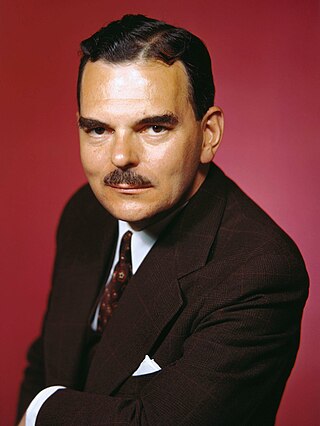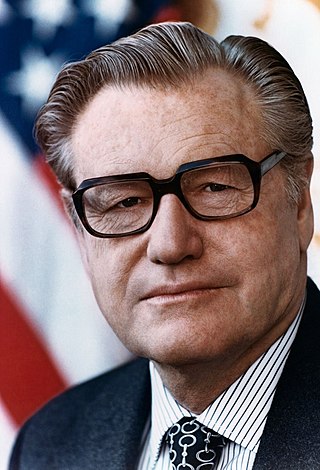
Thomas Edmund Dewey was an American lawyer and politician who served as the 47th governor of New York from 1943 to 1954. He was the Republican Party's nominee for president of the United States in 1944 and 1948, losing the latter to Harry S. Truman in a major upset. The 288 combined electoral votes Dewey received from both elections place him second behind William Jennings Bryan as the candidate with the most electoral votes who never acceded to the presidency.

Prescott Sheldon Bush Sr. was an American banker and Republican Party politician. After working as a Wall Street executive investment banker, he represented Connecticut in the United States Senate from 1952 to 1963.A member of the Bush family, he was the father of President George H. W. Bush, and the paternal grandfather of President George W. Bush and former Florida Governor Jeb Bush.

Nelson Wilmarth Aldrich was a prominent American politician and a leader of the Republican Party in the United States Senate, where he represented Rhode Island from 1881 to 1911. By the 1890s, he was one of the "Big Four" key Republicans who largely controlled the major decisions of the Senate, along with Orville H. Platt, William B. Allison, and John Coit Spooner. Because of his impact on national politics and central position on the pivotal Senate Finance Committee, he was referred to by the press and public alike as the "general manager of the Nation", dominating tariff and monetary policy in the first decade of the 20th century.

Henry Hammill Fowler was an American lawyer and politician who served as the United States Secretary of the Treasury under President Lyndon B. Johnson.

Charles Ellsworth Goodell Jr. was an American politician who represented New York in the United States House of Representatives from 1959 to 1968 and the United States Senate from 1968 to 1971. In both cases, he took office following the deaths of his predecessors, first in a special election and second as a temporary appointee succeeding Robert F. Kennedy.
Abigail Greene Aldrich Rockefeller was an American socialite and philanthropist. She was a prominent member of the Rockefeller family through her marriage to financier and philanthropist John D. Rockefeller Jr., the son of Standard Oil co-founder John D. Rockefeller Sr. Her father was Nelson W. Aldrich, who served as a Senator from Rhode Island. Rockefeller was known for being the driving force behind the establishment of the Museum of Modern Art. She was the mother of Nelson Rockefeller, who served from 1974 to 1977 as the 41st vice president of the United States.

Frank Pace Jr. was the 3rd United States Secretary of the Army and a business executive.

The Point Four Program was a technical assistance program for "developing countries" announced by United States President Harry S. Truman in his inaugural address on January 20, 1949. It took its name from the fact that it was the fourth foreign policy objective mentioned in the speech.

Edwin Frederick Jaeckle was a Republican politician and party chairman in New York State during the 1930s and 1940s. During his tenure as chairman, Jaeckle enforced strict adherence to party discipline, which significantly bolstered the party's standing in the state.

The Truman Committee, formally known as the Senate Special Committee to Investigate the National Defense Program, was a United States Congressional investigative body, headed by Senator Harry S. Truman. The bipartisan special committee was formed in March 1941 to find and correct problems in US war production with waste, inefficiency, and war profiteering. The Truman Committee proved to be one of the most successful investigative efforts ever mounted by the U.S. government: an initial budget of $15,000 was expanded over three years to $360,000 to save an estimated $10–15 billion in military spending and thousands of lives of U.S. servicemen. For comparison, the entire cost of the simultaneous Manhattan Project, which created the first atomic bombs, was $2 billion. Chairing the committee helped Truman make a name for himself beyond his political machine origins and was a major factor in the decision to nominate him as vice president, which would propel him to the presidency after the death of Franklin D. Roosevelt.

John Joseph LaFalce is an American politician who served as a Congressman from the state of New York from 1975 to 2003. He retired in 2002 after his district was merged with that of a fellow Democrat.

Harry S. Truman was the 33rd president of the United States, serving from 1945 to 1953. A member of the Democratic Party, he served as a United States senator from Missouri from 1935 to 1945 and briefly in 1945 as the 34th vice president under Franklin D. Roosevelt. Assuming the presidency after Roosevelt's death, Truman implemented the Marshall Plan in the wake of World War II to rebuild the economy of Western Europe and established both the Truman Doctrine and NATO to contain the expansion of Soviet communism. He proposed numerous liberal domestic reforms, but few were enacted by the conservative coalition that dominated Congress.
The Defense Production Administration (DPA) was an independent agency of the United States government for oversight and control of the defense production programs of the United States during wartime mobilization in the Korean War era.
The Office of Defense Mobilization (ODM) was an independent agency of the United States government whose function was to plan, coordinate, direct and control all wartime mobilization activities of the federal government, including manpower, economic stabilization, and transport operations. It was established in 1950, and for three years was one of the most powerful agencies in the federal government. It merged with other agencies in 1958 to become the Office of Civil and Defense Mobilization (1958–1961).
This bibliography of Harry S. Truman is a selective list of scholarly works about Harry S. Truman, the thirty-third president of the United States (1945–1953). See also the bibliographies at Harry S. Truman, Presidency of Harry S. Truman, and Foreign policy of the Harry S. Truman administration.

Harry S. Truman's tenure as the 33rd president of the United States began on April 12, 1945, upon the death of President Franklin D. Roosevelt, and ended on January 20, 1953. He had been vice president for only 82 days when he succeeded to the presidency. Truman, a Democrat from Missouri, ran for and won a full four-year term in the 1948 presidential election, in which he narrowly defeated Republican nominee Thomas E. Dewey and Dixiecrat nominee Strom Thurmond. Although exempted from the newly ratified Twenty-second Amendment, Truman withdrew his bid for a second full term in the 1952 presidential election because of his low popularity. He was succeeded by Republican Dwight D. Eisenhower.

Nelson Aldrich Rockefeller, sometimes referred to by his nickname Rocky, was an American businessman and politician who served as the 41st vice president of the United States from 1974 to 1977 under President Gerald Ford. A member of the Republican Party and the wealthy Rockefeller family, he previously served as the 49th governor of New York from 1959 to 1973. Rockefeller also served as assistant secretary of State for American Republic Affairs for Presidents Franklin D. Roosevelt and Harry S. Truman (1944–1945) as well as under secretary of Health, Education and Welfare (HEW) under Dwight D. Eisenhower from 1953 to 1954. A son of John D. Rockefeller Jr. and Abby Aldrich Rockefeller as well as a grandson of Standard Oil co-founder John D. Rockefeller, he was a noted art collector and served as administrator of Rockefeller Center in Manhattan, New York City.
Oscar M. Ruebhausen was a prominent New York City lawyer, and adviser to Governor Nelson A. Rockefeller, and a president of the New York City Bar Association.
Webster & Sheffield, formerly Webster, Sheffield, Fleischmann, Hitchcock & Chrystie, was a major "white shoe" law firm in New York City from 1934 to 1991. The firm concentrated on corporate and securities law, litigation, real estate, and municipal bonds.

The presidential transition of Dwight D. Eisenhower began when he won the United States 1952 United States presidential election, becoming the president-elect, and ended when Eisenhower was inaugurated on January 20, 1953.
















